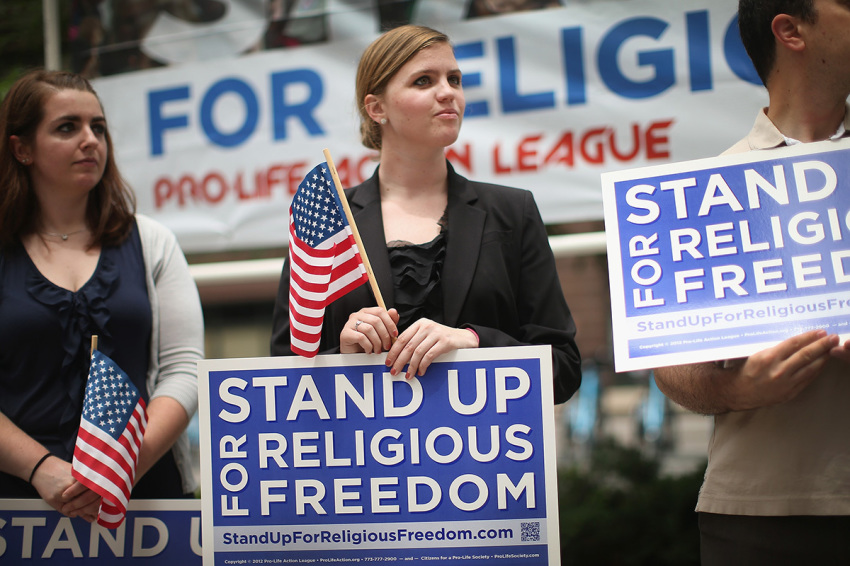Best and worst states for religious liberty: report

A new report reveals that Illinois has the most religious liberty safeguards in place as many states continue to lack adequate protections for religious people.
The Center for Religion, Culture and Democracy at First Liberty Institute released its second annual Religious Liberty in the States report last week. The report ranked all 50 states by the number of safeguards in place for religious liberty. While Mississippi scored highest last year, Illinois received the highest score this year.
Illinois’ 85% score marks an increase from the 81% it received last year. Mississippi, which received a score of 82% last year, now ranks fourth in religious liberty protections as it achieves a score of 64%. California, which came in last in 2022, now ranks fifth from the bottom while West Virginia descended to the bottom spot this year.
Safeguards that determined a state’s score include the availability of absentee voting for religious reasons and/or no-excuse absentee voting, the ability of healthcare providers to opt out of performing abortions or sterilizations and prescribing contraception if doing so violates their religious beliefs, and the presence of a Religious Freedom Restoration Act in the state.
Additional factors taken into account when ranking the states include the ability of religious entities, public officials and for-profit businesses to decline to perform or participate in same-sex weddings, as well as the ability of school-aged children to opt out of childhood vaccination requirements for religious reasons.
Illinois contains all the religious liberty safeguards except protection from having to provide an abortion during a medical emergency and a law allowing public officials to refuse to officiate same-sex marriages if doing so violates their religious beliefs. Illinois also doesn't allow for-profit businesses to opt out of providing services for same-sex weddings.
On the other hand, West Virginia, which received a score of 14% this year, only has seven religious liberty safeguards in place. The state allows employers to opt out of providing their employees with contraceptive coverage as part of employer-sponsored health insurance and allows individuals to opt out of performing abortions, including in medical emergencies. Additionally, West Virginia allows individuals as well as private and public hospitals to decline to perform sterilizations with immunity from civil liability.
Besides Illinois, only 12 additional states had scores of 50% or higher: South Carolina (67%), New Mexico (66%), Mississippi (64%), Ohio (64%), Washington (62%), Arkansas (61%), Florida (60%), Maryland (57%), Pennsylvania (55%), Utah (55%), Tennessee (51%) and Delaware (50%).
Nearly all states allow some form of absentee voting for religious reasons. The other most common religious liberty safeguard is the exemption from the health insurance mandate recovering contraceptive coverage. Only Hawaii, Georgia, Wisconsin, Iowa, Oregon, North Carolina, Virginia, New Jersey, Michigan, Colorado, New York, Vermont, California and New Hampshire do not have the exemption in place.
More than half of the states do not have a version of the Religious Freedom Restoration Act in place designed to protect religious people from having to violate their consciences: Ohio, Washington, Maryland, Utah, Delaware, Hawaii, North Dakota, Maine, Minnesota, Georgia, Wisconsin, Massachusetts, Nevada, Iowa, Oregon, North Carolina, New Jersey, Michigan, Colorado, Wyoming, Nebraska, Alaska, New York, Vermont, California, New Hampshire and West Virginia.
Ohio and Mississippi have the most protections for healthcare workers in place, while Vermont and New Hampshire have no such safeguards. Mississippi and Utah have the most protections in place for those seeking to refrain from performing or participating in same-sex marriages, while more than half of the states have no safeguards.
Specifically, South Carolina, New Mexico, Ohio, Arkansas, Pennsylvania, Tennessee, Kansas, Arkansas, North Dakota, Idaho, Montana, Alabama, South Dakota, Georgia, Wisconsin, Louisiana, Missouri, Massachusetts, Iowa, Oregon, Virginia, New Jersey, Indiana, Kentucky, Colorado, Wyoming, Nebraska, Alaska and West Virginia have no shields protecting people with sincere religious beliefs about marriage from having to perform or provide services for a same-sex wedding.
For the most part, the safeguards measured in this year’s report mirror those from last year. However, there are a few changes. In addition to exemptions from childhood immunization requirements, the scores assigned to states this year take into account whether students can receive excused absences for religious observance and religious instruction.
This year’s report lists Illinois, Washington, Florida, Pennsylvania, Hawaii, Wisconsin and Oregon as having the most protections in place for school-aged children. On the other hand, Mississippi and West Virginia do not have any religious liberty safeguards for school-age children.
Another set of additional safeguards included in this year’s report deal with religious and ceremonial life. The presence of exceptions for clergy members from laws mandating the reporting of suspected child abuse or neglect and laws allowing minors to consume alcohol for religious purposes are factors taken into consideration when ranking the states.
The states with the most protections for religious and ceremonial life are Illinois, South Carolina, New Mexico, Ohio, Washington, Maryland, Utah, Delaware, Hawaii, Arizona, North Dakota, Montana, Georgia, Iowa and Oregon. Mississippi, Texas, New Hampshire and West Virginia have no such safeguards.
Ryan Foley is a reporter for The Christian Post. He can be reached at: ryan.foley@christianpost.com



























